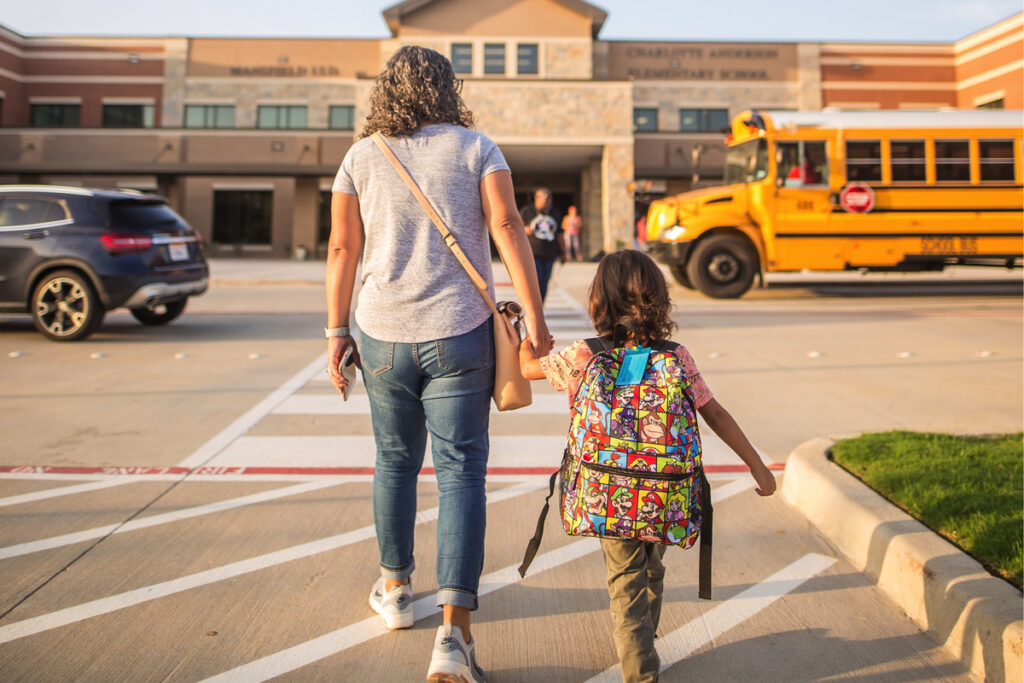Coping with Back to School and an Empty Nest
by Cyndi Williams, MSW, LCSW

Mothers approach August with a range of mixed emotions each year. Widowed mothers experience that same spectrum of emotions about back-to-school, but with some emotions that only other wister mothers will understand.
When my oldest son started kindergarten, my husband Joe and I started a tradition of taking him to get donuts on the first day of school before dropping him off. When the tradition began, Joe would take first day of school photos on the front porch and as my son boarded the bus. He was the family photographer. After he died, I carried on this tradition each year with every child, never missing a first day of school donut run. But I often forgot to take photos as the only parent getting three children ready for school, to the donut shop, and then to their respective buses on time.
No matter your child’s or children’s ages, you are watching them hit yet another milestone without the other parent. You have a new teacher, or collection of teachers, to communicate with about your child’s history and potential special grief needs and struggles. You have to attend parent-teacher conferences, IEP meetings, school parties, and events alone knowing there will be moms and dads hand-in-hand at each event.
Some may know your story and give you and your child that sympathetic look. Others may not know your family and give you that curious look, wondering why the other parent isn’t present. Some teachers will be understanding and others just won’t get it.
I had a child in the gifted program at school, another child with an IEP for a learning disability and ADD, and a child who worked very hard at school, dance, and social activities. Each one was just as unique in their emotional characteristics as they were in their educational perspectives.
I may get praise from the teachers and administration for my gifted child’s performance and behaviors in school, “especially as a solo parent,” they might say. On the other hand, for my child who required special accommodations and support, I had many meetings with a team of educators, counselors, and administration through the years. Each meeting involved a lot of anxiety leading up to the meetings. I knew he struggled with the demands of school and that his attention and impulse control issues often caused him to receive negative attention.
During these meetings I felt like I was on the witness stand, trying to defend my child and make them see he is a kind, loving, tenacious boy with a desire to please. I felt they blamed me as a solo parent for his struggles and they didn’t fight as hard for him as they might have if a father were also involved.
At dance, my child was given warnings in front of other students about being late or unprepared, but I was still in a grief fog, the only parent to get children from place to place, and I felt so guilty that she had to be embarrassed in front of her peers when she was so hard-working and could not control the fact that I was overwhelmed. I didn’t look forward to the accolades, the judgment, or the consequences my children had to suffer because I was a solo parent.
Remember as you head into this school year that you can call on your community — grandparents, other parents, teens in the neighborhood, etc. — for help with things like homework, rides, moral support at school meetings, and other areas of school-year solo parenting that you’re struggling with. In the times that you feel you fall short, remember you are doing the best you can, as you and they continue to grieve and heal and grow.
Now, after ten years of solo parenting experience, I face a new challenge this August. My youngest is leaving for her freshman year of college at a school almost four hours from home. My other two are married, working in careers, and I even had my first grandchild earlier this year.
I was a little ashamed to be feeling excited about the prospect of an empty nest. As I confessed this feeling to some other widows, some had been ashamed to admit they’d been feeling similar emotions. For others, especially wisters who have not dated or repartnered and don’t have a lot of social support, the prospect of an empty nest may be terrifying and extra sad. It’s okay to feel whatever you’re feeling right now.
I know I will miss my daughter when she leaves this month, but I am excited about eating whatever and whenever I want to eat without asking what anyone else wants, doing smaller laundry loads, having less cleanup around the house, and time to connect more often and more deeply in some of my relationships that were on the back burner when I had children at home who needed my presence and attention almost constantly.
I challenge other empty nester wisters to think of your goals, dreams, and needs that have had to be put last, and commit to radical self-love and self-care at this transitional time in your parenting.
Cyndi Williams is a mental health advisor and contributor for Modern Widows Club, currently working as a mental health therapist at Sandhill Counseling and Consultation in St. Louis, Missouri.

